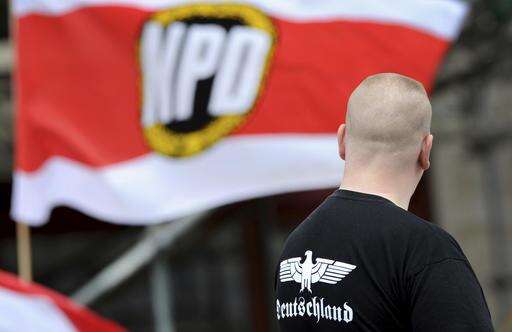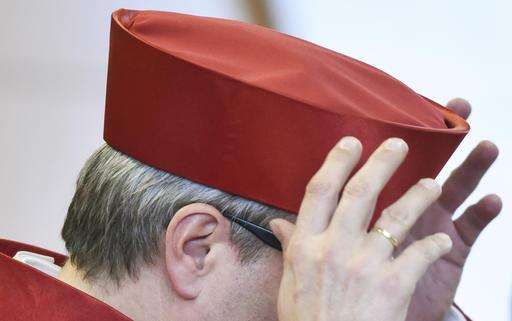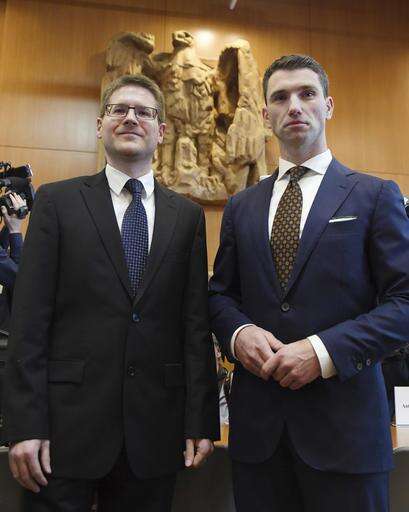FILE - In this May 1, 2016 file picture a man with a flag with National Democratic Party, NPD, logo attends a rally of the NPD in Schwerin, Germany. Germanyâs Constitutional Court will announce its verdict Tuesday Jan. 17, 2017 on a bid to outlaw the far-right party that stands accused of promoting a racist and anti-Semitic agenda. It would be the first ban of its kind since 1956. Itâs the second attempt to ban the National Democratic Party, better known by its German acronym NPD. The German parliament's upper house, which represents the country's 16 state governments, applied at the end of 2013 for a ban. (Jens Buettner/dpa via AP,file)
The Associated Press
BERLIN (AP) - Germany's supreme court on Tuesday rejected a bid by lawmakers to outlaw a fringe far-right party accused of pursuing a racist and anti-Semitic agenda.
Andreas Vosskuhle, chief justice of the Federal Constitutional Court, said that while the party's goals run counter to the German constitution, "there are currently no concrete indications ... that its actions will lead to success."
The German parliament's upper house had applied for the ban at the end of 2013.
It was the second attempt to ban the National Democratic Party, better known by its German acronym NPD. In 2003, the court rejected a previous application because paid government informants within the group were partially responsible for evidence against it.
Vosskuhle, in explaining the verdict, cited the party's political irrelevance, pointing out that it has only a single seat in the European Parliament and that the NPD's election results have in recent years been "on a low level."
Vosskuhle said that a party's questionable ideology alone wasn't reason enough for a ban. A party would need to be actively working to abolish Germany's free and democratic order, he said, adding: "There's no evidence for this here."
The rise of the nationalist Alternative for Germany party, which has assailed Chancellor Angela Merkel for allowing large numbers of migrants into the country and appeals to a much broader range of protest voters, has eroded the NPD's support in recent years.
The party isn't represented in the Bundestag after winning just 1.3 percent of the vote in the last national election in 2013. Parties need to pass a 5-percent threshold to win seats in the federal parliament. It is still represented at the local level, though, and receives money just like other parties based on its electoral performance.
The NPD could not immediately be reached for comment, but celebrated the verdict on Facebook saying it was "now fully back in business."
Only two parties have been outlawed in West Germany and reunited Germany - the neo-Nazi Socialist Reich Party in 1952 and the German Communist Party in 1956.
___
Geir Moulson and Frank Jordans contributed to this report.
FILE - The March 28, 2010 file photos shows a right wing protestor during a demonstration of the extreme right National Democratic Party of Germany (NPD) in Duisburg, Germany. Germanyâs Constitutional Court will announce its verdict Tuesday Jan. 17, 2017 on a bid to outlaw the far-right party that stands accused of promoting a racist and anti-Semitic agenda. It would be the first ban of its kind since 1956. Itâs the second attempt to ban the National Democratic Party, better known by its German acronym NPD. The German parliament's upper house, which represents the country's 16 state governments, applied at the end of 2013 for a ban. (AP Photo/Frank Augstein,file)
The Associated Press

FILE - In this June 17 2012 file picture a supporter of the National Democratic Party, NPD attends a rally in Berlin. Germanyâs Constitutional Court will announce its verdict Tuesday Jan. 17, 2017 on a bid to outlaw the far-right party that stands accused of promoting a racist and anti-Semitic agenda. It would be the first ban of its kind since 1956. Itâs the second attempt to ban the National Democratic Party, better known by its German acronym NPD. The German parliament's upper house, which represents the country's 16 state governments, applied at the end of 2013 for a ban. (Matthias Balk/dpa via AP,file)
The Associated Press

FILE - In this March 3, 2016 file picture, President Andreas Vosskuhle of the Second Senate of the Federal Constitutional Court arrives to the continuation of oral proceedings over a ban of the right-wing extremist National Democratic Party, NPD), in the courtroom of the Federal Constitutional Court in Karlsruhe, Germany. Germanyâs Constitutional Court will announce its verdict Tuesday Jan. 17, 2017 on a bid to outlaw the far-right party that stands accused of promoting a racist and anti-Semitic agenda. It would be the first ban of its kind since 1956. Itâs the second attempt to ban the National Democratic Party, better known by its German acronym NPD. The German parliament's upper house, which represents the country's 16 state governments, applied at the end of 2013 for a ban. Uwe Anspach/dpa via AP,file)
The Associated Press

Lawyer Peter Richter, left, and NPD party chairman Frank Franz wait for the verdict on the ban of the far-right NPD party at the German constitutional court in Karlsruhe, southern Germany, Tuesday, Jan. 17, 2017. (Uli Deck/pool photo via AP)
The Associated Press
Lawyer Peter Richter, left, and NPD party chairman Frank Franz wait for the verdict on the ban of the far-right NPD party at the German constitutional court in Karlsruhe, southern Germany, Tuesday, Jan. 17, 2017. (Uli Deck/pool photo via AP)
The Associated Press
NPD party leader Frank Franz goes through the security check before the verdict on the ban of the far-right NPD party at the German constitutional court in Karlsruhe, Germany, Tuesday, Jan. 17, 2017. (Uwe Anspach/dpa via AP)
The Associated Press
NPD's member of the European Parliament Udo Voigt, right, raises his arms as he goes through the security check before the verdict on the ban of the far-right NPD party at the German constitutional court in Karlsruhe, Germany, Tuesday, Jan. 17, 2017. (Uli Deck/dpa via AP)
The Associated Press
NPD party leader Frank Franz, right, arrives for the announcement of the verdict on the ban of the far-right NPD party at the German constitutional court in Karlsruhe, Germany, Tuesday, Jan. 17, 2017. (Uli Deck/dpa via AP)
The Associated Press
NPD party leader Frank Franz, right, NPD's member of the European Parliament, Udo Voigt, left, and head of the Berlin NPD Sebastian Schmidtke, center, go through the security check before the verdict to outlaw the far-right party NPD at the German constitutional court in Karlsruhe, southern Germany, Jan. 17, 2017. (Uwe Anspach/dpa via AP)
The Associated Press
NPD party leader Frank Franz, right, NPD's member of the European Parliament, Udo Voigt, and head of the Berlin NPD Sebastian Schmidtke, left, go through the security check before the verdict to outlaw a far-right party NPD at the German constitutional court in Karlsruhe, southern Germany, Jan. 17, 2017. (Uwe Anspach/dpa via AP)
The Associated Press